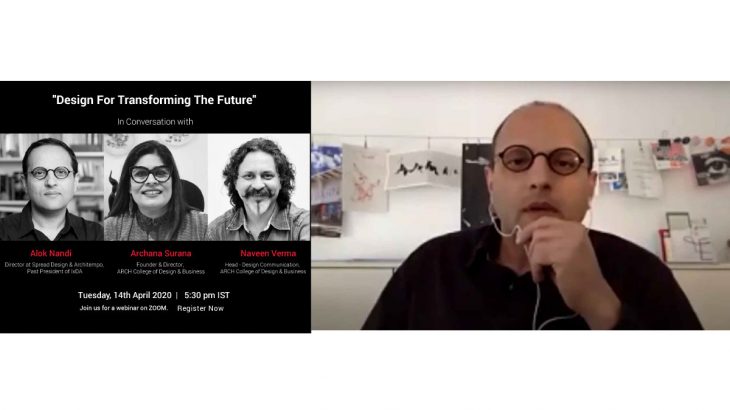In times of Corona (Covid-19), the human society is being forced to completely reassess its fundamental structures. We are wondering about the changes we need to make in the very ‘design’ of our society. From our consumer behaviour to product consumption, to the overall state of government functioning as well as economic parameters, innovative measures of prevention have become the need of the hour.
To discuss the problem at hand, design expert Alok Nandi, Director at Spread Design & Architempo, Brussels; Past-President of IxDA joined in with the Founder-Director ARCH College of Design and Business, Ms. Archana Surana, for a webinar of 250+ attendees with Naveen Verma (Head of Design, ARCH) as moderator. In the conversations that followed, the immensity of this pandemic became obvious – we are faced with a challenge that is selectively lethal to the human species, and has forced us into a complete lockdown.
We are instantly made aware of the great role being played by technology in enabling communication, and how designs conceived four to five decades ago (from the modern television, mobiles to the internet) have become our saviours. Did those inventors, designers and visionaries predict a Corona pandemic? Of course not, and yet human society would have completely collapsed right now if not for these technological marvels at hand. That is why the greatest takeaway from this era is that we must prepare designs in advance, doing our best to accurately predict problems of the future.
In doing so, we must look in both directions – the past, as well as the future. “The very short collective memory of organisations of systems has been a huge deterrent” says Alok B Nandi as he presents an example of the 2008 economic collapse – a global challenge of slightly similar proportions. He emphasises on how the same mistake must not be made in today’s time:
“As humans we tend to forget and normalise situations too fast. When we talk about transforming for the future, we must see that today we are deeply aware of the things we are missing because of Covid, but, day after tomorrow, say in two months or half a year, many people will forget the solutions and changes they are looking for today. If design doesn’t reflect now a rethinking of the short, medium and long term, then we will have missed a golden opportunity to make things better by transforming design for the future.”
Adding further to this thread of thought, Archana Surana spoke about the long-needed inculcation of natural elements in global design thinking:
“I have frequently found the ‘natural’ element missing in human design. A certain sensitivity towards our surroundings has been missing in global design thinking. Right now is a time when there is a ‘collective consciousness’ towards nature friendly designs, and a rediscovered respect for the raw force of nature against human excess, that has been re-affirmed by the Covid situation. We need to ask ourselves how we can strategise towards a ‘nature-centric’ design, shifting the focus from a ‘human-centric’ design, something I have found lacking in most definitions of design.’
Alok further highlighted the need of policy makers to rise up to the challenge with creative macro solutions that go beyond day to day troubleshooting. While he threw light on the ‘mask’ problem facing many countries and local streets, Archana pointed at the micro solutions, with little homely innovations for mask production and personal hygiene that are being applied across Indian households, leveraging their ethnic wisdom and an ancient in-built design sensibility.
In the end, it is safe to say that a synergised design harmony between bleeding-edge technology and natural, sustainable design sensibilities combined with prompt action in this short window will open doors to true design transformation.
